What is Substance Abuse?
Substance abuse refers to excessive use of a drug in a way that is harmful to self, society, or both [1]. This definition includes both psychological dependence and physical dependence. Psychological dependence leads to a state of extreme need to continue using drugs in the absence of physical dependence. Physical dependence is caused by continued drug use that leads to withdrawal symptoms when the drug is discontinued. By these definitions, alcohol is a drug that can cause both psychological and physical dependence. In the United States, 5 to 10% of the adult population is said to have a drinking problem; about 600,000 persons are addicted to heroin, and an estimated 25 million Americans have at least tried marijuana. [2]
What’s the Difference Between Substance Abuse and Addiction?
According to the National Institute on Drug Abuse (NIDA) [3], addiction is defined as the compulsive use of drugs despite harmful consequences. It is distinguished by the failure to stop using a drug; failure to meet social, work, or family responsibilities; and, sometimes (depending on the drug), tolerance and withdrawal.
In contrast, a person with a substance abuse problem will usually find that it is relatively easy to stop using the substance they are abusing. While substance abuse may not yet be an addiction, warning signs must be closely examined. Although there is a thin line that divides the two, it is important to remember that substance abuse can exist without addiction. However, substance abuse always often leads to addiction. The difficulties and challenges connected with substance abuse are much easier to overcome before a person becomes dependent upon or addicted to a substance.


Get Your Life Back
Find Hope & Recovery. Get Safe Comfortable Detox, Addiction Rehab & Mental Health Dual Diagnosis High-Quality Care at the We Level Up Treatment Centers Network.
Hotline (877) 378-4154Link Between Substance Abuse and Mental Health
When a person has both a substance abuse problem and a mental health issue such as anxiety, bipolar disorder, or depression, it is called a dual diagnosis or co-occurring disorder. Dealing with substance abuse is never easy, and it’s even more difficult when you’re also struggling with mental health problems. According to the National Institute on Dru Abuse (NIDA) [4], as many as 6 in 10 people with an illicit substance abuse disorder also experience another mental illness, and rates are similar for users of licit drugs—such as alcohol and tobacco.
Individuals entering rehab or treatment either for a substance use disorder or for another mental disorder should be evaluated for the co-occurrence of the other condition. Research indicates that treating both (or multiple) conditions or illnesses simultaneously in an integrated form is generally the best treatment approach for these clients [5].
Sex and Gender Differences in Substance Abuse
Are there gender differences in substance use disorders? The answer is yes, and this is true at any age. Women may face unique issues when it comes to substance abuse due to both sex and gender. Sex differences result from biological factors, such as hormones and sex chromosomes. In contrast, gender differences are based on culturally defined roles for women and men and those who do not identify with either category [6]. In addition, gender roles influence how people perceive themselves and how they interact with others.
Commonly, young men are most likely to try alcohol or drugs because of peer pressure or to try them in a bigger group (for example, friends, or at a party) at the time of initiation. Women, nevertheless, are more likely to initiate substances through a significant relationship, such as a family member, close friend, or significant other, in the privacy of one’s home. Most adolescent women continue using drugs or drinking to maintain this relationship, which places them at higher risk for addiction.
There are more men than women in substance abuse and addiction treatment today. Nonetheless, women usually enter substance abuse rehab with more critical behavioral, medical, psychological, and social problems. This is because women show a quicker progression from imitation to addiction than their male counterparts. Overall, women and men are both and equally as likely as one another to become addicted to alcohol or drugs. However, due to the gender differences in substance use disorders, they have very different obstacles and needs in addiction treatment. Therefore, today, drug treatment professionals recommend gender-specific treatment for substance use disorders.
Substance Abuse During the Covid-19 Pandemic
Experts say misuse of opioids and stimulants like crystal meth is also on the rise. According to the Centers for Disease Control and Prevention (CDC) [7], as of June 2020, 13.3% of Americans reported an increasing substance use to cope with stress or emotions related to COVID-19.

Data from the World Health Organization (WHO) [8] shows that 271 million people worldwide aged 15‒64 used an illegal drug once in 2020, while 35 million were suffering from substance use disorders. Under no circumstances should people use any type of substance to prevent or treat COVID-19 infection. Substance use will not protect a person from COVID-19. Different target groups have a responsibility to steer clear of substance use throughout this pandemic and beyond and to help others do the same, and get the help they need, in case they are using substances or suffering from substance use disorders.
World Health Organization (WHO) Reminders to the Public About Covid-19 and Substance Abuse
- Drugs are by no means a way of dealing with anxiety, fear, boredom or social isolation.
- Do not use psychoactive and other substances because there is no evidence that they protect against COVID-19.
- Drugs or substance abuse can increase your risk of getting COVID-19 infection through shared objects (fir example, water pipes for smoking, and syringes), and ignoring health-protective measures like hand hygiene, physical distancing and respiratory etiquettes.
- Substance abuse can also result in worse outcomes from COVID-19. For instance, inhaling substances and smoking can lessen lung function and increase vulnerability to infections.
- Individuals who struggle with substance abuse disorders are especially exposed to COVID-19 infection and worse treatment results because they are more likely to have a greater prevalence of co-morbid health conditions ( examples are. mental disorders, HIV, TB, hepatitis, cardiovascular, respiratory, liver, and kidney diseases) and often share other risk factors, such as physical inactivity, malnutrition, alcohol and tobacco use. [9]
Get Help. Get Better. Get Your Life Back.
Searching for Accredited Drug & Alcohol Rehab Centers Near You? Or Mental Health Support?
Even if you have failed previously, relapsed, or are in a difficult crisis, we stand ready to support you. Our trusted behavioral health specialists will not give up on you. Call us when you feel ready or want someone to speak to about therapy alternatives to change your life. Even if we cannot assist you, we will lead you wherever you can get support. There is no obligation. Call our hotline today.
FREE Addiction Hotline – Call 24/7Common Signs and Symptoms of Substance Abuse
The use of recreational drugs or substances, prescription drugs, or over-the-counter medications can lead to substance abuse. It can frequently lead to problems at home, work, school, and in relationships. Moreover, it can leave the user feeling helpless, isolated, or shamed. If you’re concerned about your own or a loved one’s substance use, it’s crucial to understand the warning signs and more importantly, that help is possible and treatment works.
Here are some common signs and symptoms of substance abuse:
- Risk-taking when using drugs, such as having unprotected sex, and, driving,
- Ignoring and neglecting obligations at work, school, or home
- Legal trouble, such as arrests for disorderly conduct, driving under the influence
Physical Warning Signs of Substance Abuse
- Pupils larger or smaller than usual and bloodshot eyes
- Changes in sleep patterns, appetite, and physical appearance
- Strange smells on the body, breath, or clothing, or impaired coordination
Behavioral Signs of Substance Abuse
- Poor performance and attendance and at work or school
- Engaging in suspicious or secretive behaviors
- Sudden change in favorite hangouts, friends, and hobbies
Psychological Warning Signs of Drug Abuse
- Unexplained change in attitude or personality
- Sudden irritability, mood swings, spaced-out, or angry outbursts
- Looks fearful, paranoid, or anxious, with no reason
Comfortable Facilities & Amenities
High-Quality Addiction & Mental Health Rehabilitation Treatment
Rehab Centers TourRenowned Addiction Centers. Serene Private Facilities. Inpatient rehab programs vary.
Addiction Helpline (877) 378-4154Proven recovery success experience, backed by a Team w/ History of:
15+
Years of Unified Experience
100s
5-Star Reviews Across Our Centers
10K
Recovery Success Stories Across Our Network
- Low Patient to Therapist Ratio
- Onsite Medical Detox Center
- Comprehensive Dual-Diagnosis Treatment
- Complimentary Family & Alumni Programs
- Coaching, Recovery & Personal Development Events
What is Detox?
Detoxification or commonly known as detox is a set of interventions directed at managing acute substance intoxication and withdrawal. It denotes a clearing of toxins from the body of a person who is dependent on substances of abuse [10]. Moreover, supervised or medical detoxification may prevent potentially lifethreatening complications that might arise if the person were left untreated. It is the first step for someone who is beginning rehab or treatment for severe substance abuse or addiction to drugs like benzodiazepines, alcohol, or heroin. In medical detox, the person is supervised by trained health professionals who will check and monitor symptoms and ensure that the person remains safe while withdrawing from alcohol or drugs.

What Happens During Detox in a Substance Abuse Detox Center?
The detox process can be intense but also an essential part of a person’s recovery. The detox process in a substance abuse detox center typically includes the following stages:
Evaluation
The person will begin medically supervised detox with an evaluation or assessment to make sure they receive the proper support and level of care through the detox process. The evaluation process also includes a comprehensive assessment of the person’s psychological and medical conditions, and social situation to help define the proper level of treatment after detoxification.
Stabilization
Stabilization is the part of the detoxification process where the patient starts experiencing withdrawal symptoms after taking drugs, alcohol, or both. During this stage, medical and psychotherapy is usually administered to prevent any form of harm to the client. Stabilization is different for everyone. It will vary on the type of substance and amount of detoxification needed. If necessary, doctors and clinicians can prescribe medication for addiction treatment to reduce withdrawal symptoms, as detoxing from certain substances can be difficult [11].
World-class, Accredited, 5-Star Reviewed, Effective Addiction & Mental Health Programs. Complete Behavioral Health Inpatient Rehab, Detox plus Co-occuring Disorders Therapy.
CALL (877) 378-4154End the Addiction Pain. End the Emotional Rollercoaster. Get Your Life Back. Start Drug, Alcohol & Dual Diagnosis Mental Health Treatment Now. Get Free No-obligation Guidance by Substance Abuse Specialists Who Understand Addiction & Mental Health Recovery & Know How to Help.
Ongoing Support for Continued Treatment and Recovery
This involves preparing the patient for entry into substance abuse rehab or treatment by emphasizing the importance of following through with the complete substance abuse treatment continuum of care. For patients who have shown a pattern of completing detoxification services and then failing to engage in substance abuse treatment, a written treatment contract may encourage entrance into a continuum of substance abuse treatment and care.
Find the Right Treatment Plan at We Level Up NJ
Please, do not try to detox on your own. The substance abuse detox process can be painful and difficult without medical assistance. However, getting through the detox process is crucial for continued treatment. We Level Up NJ provides proper care with round-the-clock medical staff to assist your recovery. So, reclaim your life, call us to speak with one of our treatment specialists. Our counselors know what you are going through and will answer any of your questions.
Experience Transformative Recovery at the We Level Up Treatment Center.
See our authentic success stories. Get inspired. Get the help you deserve.



Start a New Life
Begin with a free call to an addiction & behavioral health treatment advisor. Learn more about our dual-diagnosis programs. The We Level Up treatment center network delivers various recovery programs at each treatment facility. Call to learn more.
- Personalized Care
- Caring Accountable Staff
- Comfortable Amenities
- Licensed & Accredited
- Renowned w/ 5-Star Reviews
We’ll Call You
Sources
[1][2] NCBI – https://www.ncbi.nlm.nih.gov/books/NBK319/
[3][4][5] NIDA – https://www.drugabuse.gov/publications/principles-drug-addiction-treatment-research-based-guide-third-edition/frequently-asked-questions/there-difference-between-physical-dependence-addiction
[6] NIDA– https://www.drugabuse.gov/publications/research-reports/substance-use-in-women/summary
[7] CDC – https://www.cdc.gov/mmwr/volumes/69/wr/mm6932a1.htm
[8] [9] WHO – http://www.emro.who.int/mnh/news/substance-use-considerations-during-the-covid-19-pandemic.html
[10] SAMHSA – https://store.samhsa.gov/sites/default/files/d7/priv/sma15-4131.pdf
[11] Stabilization Treatment » Drug Alcohol Addiction Rehab – We Level Up





